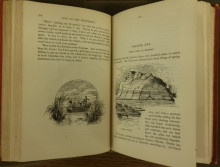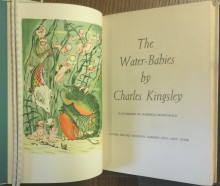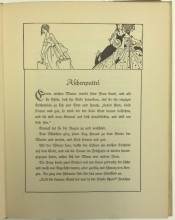Juli McLoone
Library Blogs
Showing 1361 - 1370 of 1964 items

Each June, the nonprofit waterway protection and restoration group American Rivers sponsors National Rivers Month to spotlight the more than 250,000 rivers and streams throughout the U.S. Approaching the celebration from a literary angle, today's post shares 18th and 19th century descriptions of river journeys. Read on to see America’s rivers through the eyes of John Bartram, Henry David Thoreau, and Mark Twain.

Although largely forgotten today,The Water-Babies was once one of the most popular Victorian literary fairy tales. Charles Kingsley's imaginative tour de force leaps from realistic adventure, to fantastical exploration of aquatic biology, to an imaginary voyage in the tradition of Gulliver’s Travels.

This month’s recipe is a lemon cake from Culinary gems : a collection of choice recipes gathered with care from the treasures of culinary experts, published in Westfield, Massachusetts in 1884.
Lemon was an extremely common flavor for desserts and pastries in the 19th century -- almost the default neutral flavor, the way vanilla is now. Although vanilla was known in Europe as a flavoring by the 16th century (there’s an article on it in Diderot’s Encyclopédie of 1765) and a commercial extract was available in the US from at least 1847, it overtook lemon in cakes and pies only slowly
Lemon was an extremely common flavor for desserts and pastries in the 19th century -- almost the default neutral flavor, the way vanilla is now. Although vanilla was known in Europe as a flavoring by the 16th century (there’s an article on it in Diderot’s Encyclopédie of 1765) and a commercial extract was available in the US from at least 1847, it overtook lemon in cakes and pies only slowly
•
Here is our Top 10 list of popular games for this past month. A game beats FIFA in the ranking for the first time in ages, and Smash rises in the ranks (probably students celebrating the fact that we allow it every day during the Spring and Summer).
We'll probably see more classic games making the list as well, as students vow over the Summer to finish "that old game I always wanted to get through but never had time for."
We'll probably see more classic games making the list as well, as students vow over the Summer to finish "that old game I always wanted to get through but never had time for."

HathiTrust started out with only content digitized by Google, but a goal from early on was to support digitized book material from a variety of sources. One early effort provided a toolkit to partners for preparing content, but which turned out to require more technical effort than was reasonable. We rethought our approach and simplified the requirements for partners while maintaining the same high quality standards for HathiTrust.

This short novel consists entirely of a monologue by a librarian in a small town in France. She speaks about the role of the library in society, her love life or lack thereof, her snobbish colleagues, her reflections on French history, and the deficiencies of the Dewey Decimal system.
![Arthur Dee (1578-1651). Fasciculus chemicus, abstrusae hermeticae scientiae, ingressum, progressum, coronidem, verbis apertissimis explicans [Paris: 1631]](/sites/default/files/styles/medium/public/img_0688.jpg?itok=PrvvVdZE)
Shortly after I completed a blog post arguing that the Special Collections Library holds a book formerly owned by Isaac Newton, another one has just resurfaced from the Le Roy Crummer Collection, part of our rich holdings in the history of medicine.

Our last Fairy Tale Friday recounted Hans Christian Andersen’s The Red Shoes - a story about a girl whose vanity led to the loss of her feet and, ultimately, her life. Footwear features prominently again in today’s fairy tale. However, unlike Karen’s cursed dancing shoes, Aschenputtel finds that her golden slippers are the vehicle of her own reward and of revenge against her cruel stepsisters.

The Special Collections Library Image Bank is a repository intended to capture the digitized images of Special Collections materials in the public domain created for incidental requests — such as those from patrons or from curatorial staff for outreach initiatives.
